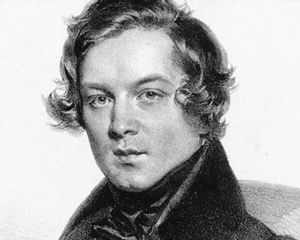Robert Schumann was born on June 8th, 1810, in Zwickau, Saxony, Germany.
罗伯特.舒曼于1810年6月8日出生在德国萨克森州的茨瓦波。
His father was a writer and bookseller who encouraged Robert's love of literature, which remained evident throughout most of his life.
他的父亲是一位作家和书商,正是他鼓励了罗伯特对文学的热爱,这种热爱贯穿了他一生的大部分时间。
Through the urging of his mother, he studied law at the University of Leipzig until 1830 when he quit to devote his time completely to music.
在母亲的敦促下,舒曼在莱比锡大学学习法律,直到1830年才辞职全身心投入到音乐当中。
In 1833, at the age of 23 he partnered to form a music journal titled, "The New Music Journal", in which he served as sole editor from 1835 to 1844.
1833年,在他23岁的时候,他合伙成立了一个音乐杂志,名为“新音乐杂志”,并在1835年到1844年担任独家编辑。
Much against her father's wishes, Schumann married the daughter of his piano teacher, Clara Wieck, who was an extremely talented and already established pianist, in 1840.
1840年,舒曼违背了父亲的意愿,娶了自己的钢琴老师克拉拉·威克的女儿为妻。克拉拉·维克是一位才华横溢的钢琴家,当时已经有了一定的名气。

This marriage marked the beginning of a partnership well ahead of its time in which both
这段婚姻标志着一段合作关系的开始,在这段合作关系中,
Robert and Clara Schumann attempted to balance their relationship with each other with their successful music careers.
罗伯特·舒曼和克拉拉·舒曼都试图在他们成功的音乐生涯中平衡彼此之间的关系。
As a music critic, he was quick to dismiss the adoration of fellow musicians whom he considered inferior,
作为一名音乐评论家,他很快就摒弃了那些他认为不如他的音乐家们的崇拜,
yet was the first to recognize and praise the genius of musicians such as Frederic Chopin and Johannes Brahms.
但却是第一个承认和赞扬像肖邦和布拉姆斯这样的天才音乐家的人。
A master of the character piece, Robert Schumann gained notoriety by his ability to set a scene and portray an emotion within only the first few measures of a composition.
作为人物角色的大师,罗伯特·舒曼因其在作曲的最初几个步骤中便能设定场景并描绘情感的能力而闻名。
Many of his works featured creative and imaginative titles such as "Scenes From Childhood", "Carnaval", and "Butterflies".
他的许多作品都以富有创造性和想象力的标题为特色,如《儿时情景》、《狂欢节》和《蝴蝶》。
Being the Romantic composer that he was, he often signed many of his critiques with whimsical names such as Florestan,
作为一个浪漫主义作曲家,他经常用一些古怪的名字来写自己的评论,比如“弗洛雷斯坦”,
which represented the out-going and impetuous side of his personality, and Eusebius, which portrayed his introverted and melancholic qualities.
代表了他性格外向和冲动的一面,“尤西比乌斯”,描绘了他性格内向和忧郁的特质。
After a failed suicide attempt in 1854, in which he attempted to drown himself in the river Rhine,
1854年,他企图在莱茵河自尽,自尽未遂后,
he began showing signs of insanity which included hallucinations, voices in his head, and lose of memory, and was committed to an insane asylum.
他开始表现出精神错乱的迹象,会出现幻觉、幻听和失忆,之后被送进疯人院。
He died two years later on July 29th, 1856, at the age of 46.
两年后,他于1856年7月29日去世,享年46岁。











